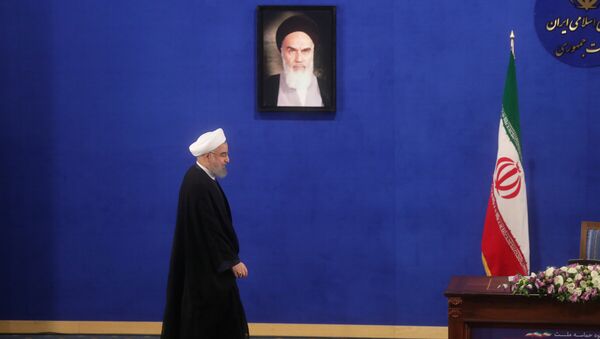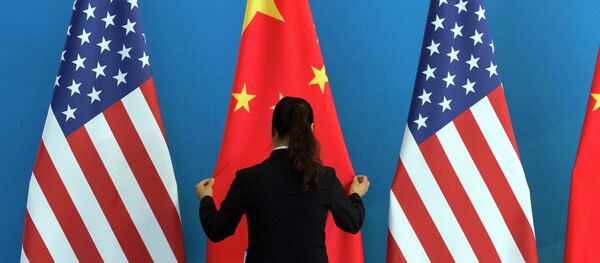The Trump administration's tendency to conduct a ‘war of words' has turned into a sort of political trend, Vladimir Fitin, a senior analyst at the Russian Institute for Strategic Studies (RISS), says, commenting on Tehran's warning that it will abandon its nuclear deal with global powers if the US imposes more sanctions on Iran.
"If America wants to go back to the experience [of imposing sanctions], Iran would certainly return in a short time — not a week or a month but within hours — to conditions more advanced than before the start of negotiations," Iranian President Hassan Rouhani said Tuesday during a parliament session, as cited by Reuters.
However, according to Fitin, it is highly unlikely that Tehran or any of the P5+1 member states will withdraw from the agreement since no one is really interested in ruining the deal.
"I do not think that this [warning] has any real foundations for now, because, except for the United States, all the other participants [of the nuclear deal] are completely uninterested in ripping this document up, since it had taken a lot of work, time, and efforts to come to joint conclusions," the political analyst told Sputnik.
Moreover, according to the analyst, Washington is also unlikely to put its threat to unilaterally withdraw from the agreement into action: in any event, it would require the EU's approval to reconsider or abandon the joint deal, the analyst remarked.
"This exchange of belligerent statements with Iran was initiated by the Americans,… [This] has begun immediately after the new [Trump] administration came to power and [US President] Trump officially declared Iran to be the major enemy of the US and the so-called 'civilized world'," Fitin elaborated.
The political analyst highlighted that this pattern is strikingly similar to the war of words between Washington and Pyongyang over North Korea's missile tests.
Nevertheless, Washington is imposing new restrictions against Tehran due to Iran's ongoing missile tests.
"Iran argues that this is absolutely unreasonable and has nothing to do with the JCPOA adopted by Iran and P5+1," Fitin emphasized, adding that Iran's parliament has recently voted to allocate $520 million to develop the country's missile program.
Commenting on the issue, Moscow-based historian and journalist Stanislav Khatuntsev says that it doesn't matter much to Iran's opponents in Washington whether Tehran is acting in accordance with the nuclear agreement.
"Iran is strictly observing the nuclear agreement signed during [Barack] Obama's presidency. However, very influential political forces, which are fierce and open opponents of Iran, have recently emerged in the United States," Khatuntsev told Radio Sputnik, assuming that it is anti-Iran lobbyists who are at the root of the current US-Iranian political standoff.
The journalist pointed to a strong tendency among US foreign policy makers to turn a blind eye to brazen human rights abuses on the part of their allies and to crack down against their geopolitical rivals for any "misconduct."
"The West in general, including the United States,… has long been doing whatever it wants on the international arena. It does not matter [to them] that the agreement is signed and that the other party respects them," Khatuntsev said.
On July 14, 2015, Iran and the P5+1 group of countries, comprising the United States, Russia, China, France and the United Kingdom plus Germany, signed the Joint Comprehensive Plan of Action, ensuring the peaceful nature of Tehran's nuclear program in exchange for sanctions relief. The plan came into force on January 16, 2016.



